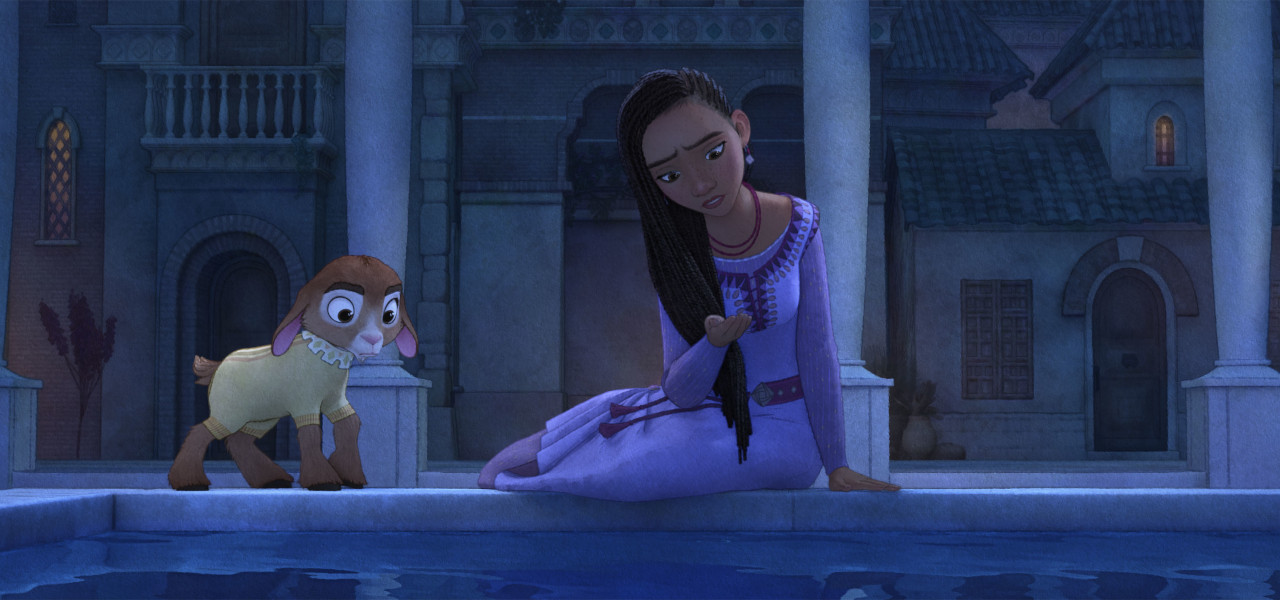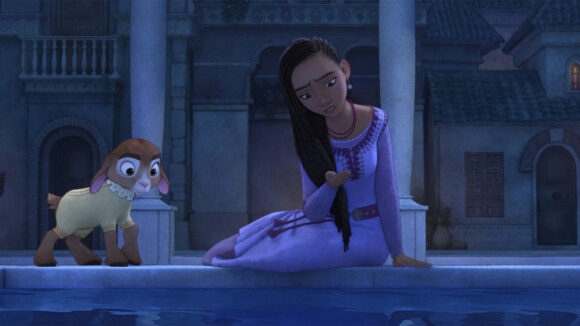

‘Wish’ Reviews Roundup: Disney’s Latest Falls Flat With Critics
Disney’s Wish hits theaters this Thanksgiving holiday weekend, but critics have found little to be thankful for in the studio’s latest musical feature.
The film, directed by Chris Buck (Frozen) and Fawn Veerasunthorn (head of story, Raya and the Last Dragon), is billed as a celebration of Disney’s 100th anniversary and is loosely inspired by the classic Disney song “When You Wish Upon a Star.” It tells the story of Asha, a young idealist who joins forces with an anthropomorphized star and a talking baby goat to take down a tyrannical sorcerer-king. It’s got all the ingredients that an audience would expect from a big Disney animated release.
For the most part, early Wish reviews are all over the place. Some critics loved the easter eggs and regular nods to classic Disney films, while others felt they were shoehorned in and became unnecessary distractions. Some reviewers were complimentary about the film’s original music, yet others say Wish is missing a signature song like Encanto’s “We Don’t Talk About Bruno” or Frozen’s “Let it Go.”
There are two things that most of the available reviews agree on: The animation is incredible, and the story is not.
As is typically the case, the artists at Walt Disney Animation Studios have impressed nearly everyone with the quality of their work. While the studio isn’t the first to explore a more stylized approach to cg animation (in this case, inspired by 2d and watercolor), the consensus is that they’ve done it as well as anyone with Wish.
Regarding the film’s narrative, most critics agree that Wish feels more like a 90-minute-long Disney propaganda product than an original piece of storytelling.
Rotten Tomatoes keeps a running tally of critics’ scores for every Disney animated theatrical release. At the time of publishing, Wish has a critics’ score of 48%, which ranks 65th among the 73 films on that list. It sits between Atlantis: The Lost Empire (49%) and Return to Neverland (45%). And this isn’t a case of review-bombing. So far, of the 33 “Top Critics” whose reviews have been tallied by Rotten Tomatoes, 23 gave it a Rotten rating.
Here’s what the critics are saying about Disney’s Wish.
Lindsey Bahr’s review for the Associated Press did a good job summing up what many critics were most turned off by with Wish:
Walt Disney Animation’s Wish is stunning to look at with textured and rich watercolor-inspired animation and easter egg treasures for audiences nostalgic for the classics. But it is also more concept than story: A strained and forgettable attempt to pay homage to the studio’s 100 years. The origin of the wishing star is as fine a motivation as any for a jumping off point, but Wish, directed by Chris Buck and Fawn Veerasunthorn, seems to have been drawn not from someone’s earnest imagination and dreams, but a corporate board trying to reverse-engineer magic and charm.
Brian Tallerico was equally unimpressed in his review for Rogerebert.com:
Disney’s Wish is the most aggressive piece of Disney propaganda in years. Sure, they all are to a certain extent, but films like The Lion King or even Encanto stand on their own as stories, whereas Wish feels more closely tied to the history of the Mouse House and the power of imagination that fans have found in it than anything the company has ever produced. It’s not just the abundant references to everything from Peter Pan to Mary Poppins to Bambi and beyond, but the sense that the entire production is about how we really need to keep wishing on not just stars, but Disney-branded ones, to make ourselves happy.
Lovia Gyarkye at The Hollywood Reporter felt Wish lacked clear direction:
If Wish is any clue, it seems Disney would rather not commit to any single direction. Directed by Chris Buck and Fawn Veerasunthorn, the film represents an awkward marriage between old and new ways. Even during its more successful moments, Wish’s magic falls flat. The film is weighed down by its purpose: to revel in Disney nostalgia while soaring into the future.
Near the end of his Variety review, Owen Gleiberman says Wish falls well below Disney’s high standards:
Frozen and Encanto, the Disney animated landmarks of the last decade, both featured heroines tussling with their own natures. In Wish, the lines are too cleanly drawn to tap our imaginations. The songs, by Julia Michaels and Benjamin Rice, are catchy, though in a consumable way that makes it hard not to notice how much they’re imitating the Lin-Manuel Miranda school of verbal aggression wrapped in hooks. Sorry, but there’s no “We Don’t Talk About Bruno” or “Let It Go” here. That may sound like a high bar, but it was Disney, with the quality of those songs (and those films), that raised the bar. The strategy behind Wish seems to be: If we do an homage to enchantment, the audience will be enchanted. True magic, however, can’t be recycled.
Bilge Ebiri, for New York Magazine and Vulture, was among the harshest of all critics, writing about how the film failed on every level:
It’s a promising, challenging idea with the competing poles of reverence and self-awareness built into the film’s very reason for existence. Unfortunately, Wish manages to be none of the things it wants to be. It is neither evocative enough of the past to work as a tribute, nor irreverent or inventive or just plain funny enough to justify its constant but half-hearted callouts. It’s the ultimate cop-out — a lifeless, uninspiring mess of bland brand management.
John Nugent at Empire agreed with many of the most frequent criticisms of the film, but that didn’t stop him from enjoying Wish:
[C]ome the inevitable happy-ever-after ending, in which — and this should not be considered a spoiler — wishes come true, it’s hard not to be swept up by the old-fashioned Disney magic of it all. This might not be the venerable animation house at its very best, but it is a reminder of why they have endured for so long. Why change a formula when it’s a winning one?
Kate Erbland’s Indiewire review was the most positive we found, and praised the film for taking Disney in a new direction for the future:
As Disney celebrates its 100th year, Wish serves as a throwback to the past, a celebration of the present, and a gentle push into the future. (That said, its repeated mentions of Peter Pan feel weird and out of place.) Asha’s journey is a classic one, but her biracial background, the immigrant story at its heart, her diverse group of friends, and skipping a love-interest subplot hint at something more subversive, something more timely, something more interesting afoot in the House of Mouse. That’s what we wish to see more of, and soon.

.png)